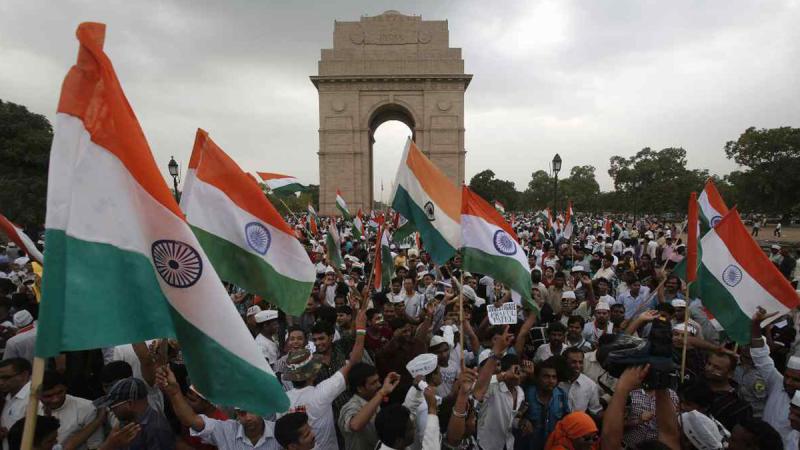 Suddenly, anti-corruption drives and ‘sarkari’ cost-cutting is big news all across official India. Even known profligate entities, ranging from almighty central ministries whose performance is beyond questioning to state chief ministers with Godzilla-size egos, are rediscovering the bliss and joy of plain, simple living. The cynical may suggest that impressive self–critical noises from Indian politicians are usual in the pre-election mode. But that does not stop the mainstream Indian media from taking such stuff seriously.
Suddenly, anti-corruption drives and ‘sarkari’ cost-cutting is big news all across official India. Even known profligate entities, ranging from almighty central ministries whose performance is beyond questioning to state chief ministers with Godzilla-size egos, are rediscovering the bliss and joy of plain, simple living. The cynical may suggest that impressive self–critical noises from Indian politicians are usual in the pre-election mode. But that does not stop the mainstream Indian media from taking such stuff seriously.
To give only two recent examples: no less a person than the defence chief of India, General Bipin Rawat, has slammed some extravagant practices and habits in his department. This in itself is a major surprise. Normally, the defence department’s performance records in India, as well as the state of its finances, have generally remained beyond the purview of lesser mortals — and that includes taxpaying citizens and nosy journalists.
West Bengal’s mercurial Chief Minister Mamata Banerjee also has called for a more Spartan approach among state officials when it comes to spending on official functions etc. She assumed power in 2011. Her first cost-cutting call comes only a few months before the Lok Sabha polls scheduled for 2019, late in her second tenure. “I would not like even one rupee to be wasted,” she thundered at a conference in north Bengal, as rows of silent officers listened, their heads bowed deeply.
How effectively has she followed her own advice from 2011 to 2018?
West Bengal owed the central Government a little over Rs 190,000 crore in 2011. By 2018, even as Banerjee spends crores of rupees in official ad campaigns tom-toming her ‘success’, Bengal’s debt has risen to Rs 330,000 crores. So much for Mamata Banerjee’s slogans and their implementation!
So far, Delhi has never pressed Bengal to make serious repayment efforts, content only with collecting the annual interest payment on pending debt — starting off with Rs 26,000 crore initially, currently rising to Rs 40,000 crore plus. Ms Banerjee has called such payment s collected by Delhi as “Banglake kendrer banchana” (the centre’s exploitation of Bengal) when by even minimalist logic, the boot can clearly be seen to be on the other foot.
Her demand: Delhi must write off unconditionally the entire debt!
Now for a brief look at what General Rawat is proposing.
It appears that he has targeted more than extravagance, costly staged functions or other wasteful expenditure in his special directive which has been sent to all army units in India, through the Internal Army Wide Area network. His objective: to improve the ‘internal health’ of the army.
Targeting corruption, he warns that cases of graft etc would be dealt with severely. There must be no more misuse of liquor, groceries etc from the Central Stores Department (CSD), which is supposed to cater to authorised personnel only. However, misuse has been reported even from minor units.
Expressing his concern that cases involving ‘moral turpitude’ are on the rise, the General has also cautioned officers who resort to ‘sycophancy with an eye on their career’. Punishment for graft etc may result in dismissal without pension benefits.
The reaction so far has been muted. There have been murmurings among higher Army staff that the directive was not really new, that such messages had been received before. Some of his suggestions are covered by existing rules.
But people resorting to such arguments are doing the General less than justice. No one recalls anyone spelling out the possibility of ‘action’ against officials who indulge in sycophancy, for instance. This must count as a unique observation in the annals of the defence administration anywhere in the world!
Why Gen Rawat has gone even further. He has ventured into an even more sensitive personal territory where angels fear to tread, the area of one’s food and drinks. Specifically mentioning ‘Puris, pakodas, sweets and deep fried unhealthy food’ as the stuff to be avoided, he calls for the consumption of ‘more healthy alternatives’—without mentioning any!
The reaction of the average North Indian soldier if he is asked to stay off his ‘Puri Vaji and chicken Pakodas’, a South Indian soldier asked to avoid crisp ‘Dosas’ which may be deep-fried, or the Bengali Sepoy to desist from eating ‘Rasogollas’ — is best left to one’s imagination. Rawat’s well-meant advice may not trigger another Sepoy Mutiny in 2018, but is it practicable?
As for sycophancy, the issue gets even more convoluted. Who is to decide what constitutes sycophancy and what does not? Someone’s flattery may be sweet music for Peter’s ears while it may be absolute poison for Paul. In case of any disagreement on such matters, a sure consequence if this is to be treated as an administrative issue, who is to be the appellate authority? Above all, what has the Indian army to do with intangibles such as this?
A Kolkata-based an analyst told Bangla Tribune,”The General’s ideas are certainly good for a shake-up within the arm, but perhaps he has bitten off more than he can chew in his martial enthusiasm.”
A more comprehensive summing up comes from Aurobindo Banerjee, ex-chief income tax commissioner, Chennai circle. His take on the Rawat’s message on social media deserves quoting: “V.P. Singh (former Prime Minister) had tried this (anti-corruption drive) in the Income Tax department during his tenure as Union Finance Minister in 1985 with a team of dedicated officers—to identify the corrupt in higher levels. The then Inspection Division of the CBDT reporting Direct Chairman CBDT was entrusted with the job of identifying the corrupt (even the public knew who were corrupt—as is the case now!).
“The result was a big zero. Except for a few compulsory retirements and a few ‘voluntary’ retirements sought by and granted to corrupt officers — the net result was less than 1% success!
“All those retired compulsorily came back triumphantly with renewed vigour and opportunities to make money through unjust enrichment. After the exit of the FM and the then Chairman, the Head of the Inspection division was made to suffer much ignominy including threats to his life, until his retirement in 2004!”
Banerjee concludes, “I wish you success, General, as a 76-year-old ex-Civil Servant, but I must warn you that corruption is in the DNA of Indians and any attempt to even try to fight this menace must necessarily prove very costly. God bless you, General."


